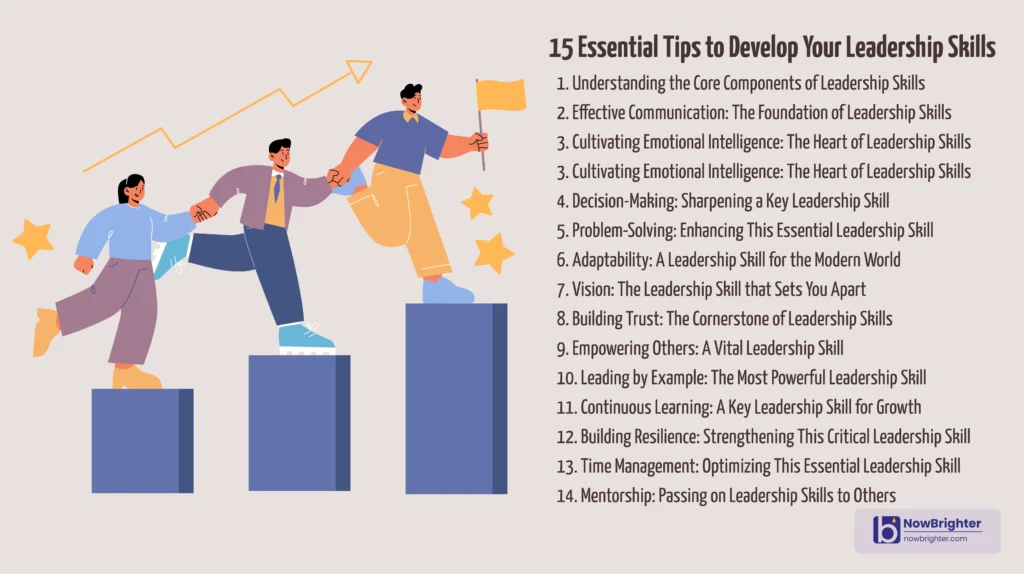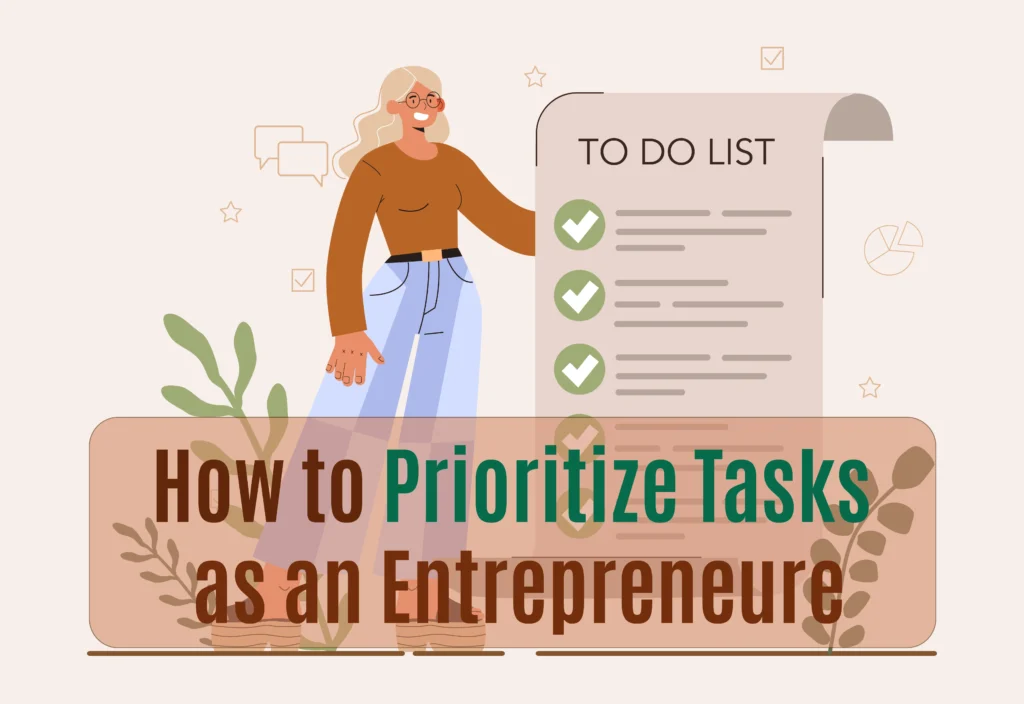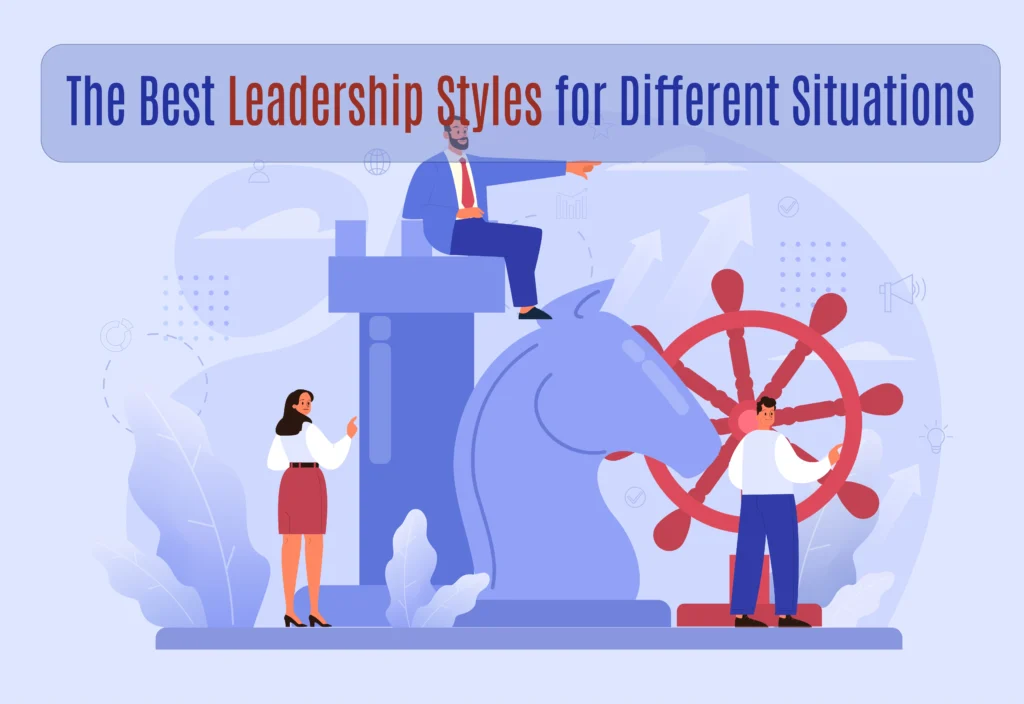How to Develop Your Leadership Skills: 15 Essential Tips for Effective Leadership
In today’s fast-paced and ever-evolving world, possessing strong leadership skills is more important than ever. Whether you’re managing a team at work, leading a community project, or guiding your family through life’s challenges, your ability to lead effectively can make all the difference. But how exactly do you develop leadership skills? Is it something you’re born with, or can these skills be cultivated over time? The good news is that leadership is not an innate quality but rather a set of skills that can be honed and developed with dedication and practice.
Trust is the cornerstone of effective leadership. By reading this guide, you’re taking the first step toward building that trust with your team, peers, or followers. You’ll discover practical, actionable strategies to enhance your leadership skills, allowing you to lead with confidence and inspire those around you. So, whether you’re an aspiring leader or someone looking to refine your existing abilities, this guide is designed to help you on your journey toward becoming the leader you were meant to be.

1. Understanding the Core Components of Leadership Skills
Before diving into the development process, it’s essential to understand what leadership skills entail. Leadership is not just about giving orders or making decisions; it’s about guiding a group toward a common goal, fostering collaboration, and inspiring others to reach their full potential.
Key leadership skills include:
- Communication: The ability to convey ideas clearly and listen actively.
- Emotional Intelligence: Understanding and managing your emotions and the emotions of others.
- Decision-Making: The capacity to make informed choices, often under pressure.
- Problem-Solving: Identifying issues and finding effective solutions.
- Adaptability: Being flexible and open to change.
- Vision: Having a clear sense of direction and purpose.
2. Effective Communication: The Foundation of Leadership Skills
Communication is the bedrock of all leadership skills. Without effective communication, your vision, goals, and strategies cannot be conveyed to your team. Great leaders are also great listeners—they understand the importance of hearing what others have to say and incorporating that feedback into their decisions.
Example: Consider the leadership style of Steve Jobs. Known for his visionary approach, Jobs was also an exceptional communicator. His ability to articulate his vision for Apple inspired his team and turned Apple into one of the most successful companies in the world. Developing your communication skills involves practicing active listening, refining your public speaking abilities, and learning to convey your ideas with clarity and conviction.
3. Cultivating Emotional Intelligence
Emotional intelligence (EI) is a critical component of leadership skills. Leaders with high EI can understand their own emotions and those of their team members, leading to better team dynamics and decision-making.
How to Improve Emotional Intelligence:
- Self-awareness: Regularly reflect on your emotions and how they impact your behavior.
- Empathy: Put yourself in others’ shoes to understand their perspectives.
- Relationship Management: Build strong, positive relationships within your team.
Example: Oprah Winfrey is often cited as a leader with high emotional intelligence. Her ability to connect with people on an emotional level has made her a beloved figure and a successful leader in the media industry.
4. Decision-Making
The ability to make sound decisions, often under pressure, is one of the most crucial leadership skills. Good leaders gather relevant information, weigh the pros and cons, and make decisions that align with their vision and values.
Strategies for Better Decision-Making:
- Gather Information: Collect data and opinions from various sources before making a decision.
- Evaluate Options: Consider the potential outcomes of each option.
- Take Responsibility: Own your decisions, whether they succeed or fail.
Example: Jeff Bezos, the founder of Amazon, is known for his decisive leadership style. His ability to make bold decisions, such as the launch of Amazon Prime, has been key to the company’s success. Developing your decision-making skills involves learning to trust your instincts, analyzing situations thoroughly, and being willing to take calculated risks.
5. Problem-Solving
Problem-solving is another critical leadership skill. Effective leaders don’t shy away from challenges; instead, they embrace them and find solutions that drive their team forward.
Steps to Improve Problem-Solving:
- Identify the Problem: Clearly define the issue at hand.
- Analyze the Situation: Break down the problem into smaller parts to understand it better.
- Brainstorm Solutions: Encourage creative thinking and consider multiple approaches.
- Implement and Evaluate: Choose the best solution and assess its effectiveness.
Example: Elon Musk, CEO of SpaceX and Tesla, is renowned for his problem-solving abilities. Whether it’s engineering a reusable rocket or solving production issues at Tesla, Musk’s innovative approach to problem-solving has set new industry standards.
6. Adaptability
In a rapidly changing world, adaptability is a crucial leadership skill. Leaders must be able to pivot quickly in response to new challenges and opportunities. Adaptable leaders are open to new ideas, embrace change, and encourage their teams to do the same.
How to Become More Adaptable:
- Stay Informed: Keep up with industry trends and new developments.
- Be Open to Feedback: Use feedback as a tool for growth and improvement.
- Embrace Change: View change as an opportunity rather than a threat.
Example: During the COVID-19 pandemic, many leaders had to quickly adapt to remote work environments. Those who succeeded were the ones who embraced the change and found new ways to keep their teams engaged and productive. Developing adaptability as a leadership skill involves staying flexible, being open to new experiences, and continuously learning.
7. Vision
A leader without vision is like a ship without a compass. Visionary leadership involves having a clear, compelling picture of the future and the ability to inspire others to work towards it.
Developing Visionary Leadership:
- Set Clear Goals: Define where you want to go and how you plan to get there.
- Inspire Others: Communicate your vision in a way that motivates and energizes your team.
- Stay Focused: Keep your eyes on the long-term goals, even when facing short-term challenges.
Example: Nelson Mandela’s vision of a free and equal South Africa inspired millions and ultimately led to the end of apartheid. Developing a strong vision requires clarity of purpose, the ability to inspire others, and a steadfast commitment to your goals.
8. Building Trust
Trust is essential for effective leadership. Without trust, your team may not feel comfortable taking risks, sharing ideas, or following your lead. Building trust requires consistency, honesty, and integrity.
Ways to Build Trust as a Leader:
- Be Transparent: Share information openly and honestly.
- Keep Your Promises: Follow through on your commitments.
- Show Respect: Treat your team members with respect and value their contributions.
Example: Satya Nadella, CEO of Microsoft, has built a culture of trust within the company by promoting transparency, fostering a growth mindset, and encouraging collaboration. Trust-building is a continuous process that requires time, effort, and a commitment to ethical leadership.
9. Empowering Others
Empowerment is about giving your team the tools, resources, and authority they need to succeed. Empowered employees are more engaged, productive, and committed to the organization’s goals.
How to Empower Your Team:
- Delegate Authority: Trust your team members to make decisions within their areas of responsibility.
- Provide Resources: Ensure your team has the tools and information they need to do their jobs effectively.
- Encourage Growth: Support professional development and continuous learning.
Example: Richard Branson, founder of the Virgin Group, is known for empowering his employees by giving them the autonomy to make decisions and take ownership of their work. Empowering others is a leadership skill that fosters a sense of ownership and accountability within your team.
10. Leading by Example
Leading by example is perhaps the most effective way to develop your leadership skills. When you model the behaviors, attitudes, and values you expect from your team, you set a powerful precedent.
Ways to Lead by Example:
- Demonstrate Commitment: Show dedication to your work and your team’s success.
- Maintain Integrity: Act with honesty and uphold ethical standards in all situations.
- Show Resilience: Handle challenges with grace and a positive attitude.
Example: Mahatma Gandhi’s leadership was defined by his commitment to nonviolence and civil disobedience. He led by example, inspiring millions to follow his path toward social justice. Leading by example involves practicing what you preach and serving as a role model for your team.
11. Continuous Learning
Leadership is not a destination but a journey of continuous learning and improvement. The best leaders are those who never stop learning and growing.
How to Embrace Continuous Learning:
- Seek Feedback: Regularly ask for feedback from your peers and team members.
- Stay Curious: Keep up with the latest trends and best practices in your field.
- Invest in Professional Development: Take courses, attend workshops, and read books on leadership.
Example: Bill Gates, co-founder of Microsoft, is known for his lifelong commitment to learning. Despite his immense success, Gates continues to read extensively and stay informed about global issues. Continuous learning is a leadership skill that keeps you sharp, relevant, and prepared for new challenges.
12. Building Resilience
Resilience is the ability to bounce back from setbacks and keep moving forward. It’s a crucial leadership skill, especially in times of crisis.
Strategies for Building Resilience:
- Stay Positive: Focus on the opportunities that challenges present.
- Learn from Failure: View failures as learning experiences that contribute to growth.
- Maintain a Support System: Surround yourself with people who can provide support and encouragement.
Example: Winston Churchill’s leadership during World War II exemplified resilience. Despite numerous challenges, he remained steadfast in his resolve and led his country through one of its darkest times. Building resilience as a leadership skill involves staying optimistic, learning from your experiences, and maintaining a strong support network.
13. Time Management
Effective time management is crucial for leaders who must juggle multiple responsibilities. By managing your time well, you can be more productive and ensure that your team stays on track.
Tips for Better Time Management:
- Prioritize Tasks: Focus on the most important tasks first.
- Set Clear Deadlines: Ensure that projects are completed on time by setting and adhering to deadlines.
- Avoid Multitasking: Concentrate on one task at a time to ensure quality work.
Example: Tim Cook, CEO of Apple, is known for his disciplined approach to time management. By maintaining a structured schedule, he ensures that he has time for strategic thinking, decision-making, and personal well-being. Effective time management is a leadership skill that enables you to balance your responsibilities and lead your team efficiently.
14. Mentorship
Mentorship is a powerful way to develop your leadership skills while helping others grow. By mentoring others, you can share your knowledge, provide guidance, and foster the next generation of leaders.
How to Be an Effective Mentor:
- Be Available: Make time for regular meetings and check-ins with your mentee.
- Share Experiences: Offer insights from your own experiences to help your mentee navigate challenges.
- Encourage Independence: Help your mentee develop their decision-making and problem-solving skills.
Example: Sheryl Sandberg, COO of Facebook, has been a mentor to many young leaders. Her guidance and support have helped others develop their leadership skills and achieve their career goals. Mentorship is a leadership skill that allows you to leave a lasting legacy by empowering others.
15. Conflict Resolution
Conflicts are inevitable in any group setting, and effective leaders must be skilled at resolving them. Conflict resolution is a vital leadership skill that involves addressing disagreements in a constructive and positive manner.
Steps for Effective Conflict Resolution:
- Address Issues Early: Don’t let conflicts fester—address them as soon as they arise.
- Listen to All Sides: Ensure that everyone involved has the opportunity to share their perspective.
- Find Common Ground: Identify shared goals and work towards a mutually beneficial solution.
Example: Jacinda Ardern, Prime Minister of New Zealand, has been praised for her empathetic and effective conflict resolution skills, particularly in times of national crisis. Mastering conflict resolution as a leadership skill involves being proactive, empathetic, and focused on finding solutions that benefit everyone involved.
Conclusion
Developing your leadership skills is a continuous process that requires dedication, self-awareness, and a commitment to growth. By focusing on core leadership skills such as communication, emotional intelligence, decision-making, and adaptability, you can become a more effective leader and inspire those around you to achieve their best.
Remember, leadership is not about having all the answers or being the most powerful person in the room. It’s about guiding, inspiring, and empowering others to work together towards a common goal. Whether you’re leading a small team or a large organization, the principles outlined in this guide will help you develop the leadership skills you need to succeed.
Now that you’ve gained valuable insights into how to develop your leadership skills, it’s time to put these strategies into practice. Start by setting specific goals for your leadership development, and make a commitment to continuously improve. Share this guide with others who are on their leadership journey, and let’s work together to build a world full of inspiring, effective leaders.












